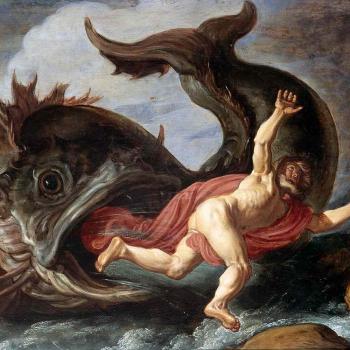Around the campfire, an ancient Jewish storyteller related the trials of Jonah the prophet. God had called on him to tell the people of Nineveh that they were in danger of judgment and Jonah ran. Thrown from the boat he had hired, Jonah had been swallowed by a big fish and in chapter two, the storyteller recites his prayer from beneath the surface of sea:
“I called out to the Lord, out of my distress,
and he answered me;
out of the belly of Sheol I cried,
and you heard my voice.
The people gathered around the campfire would have recognized the prayer. It is like many of the prayers that can be found in the Book of Psalms. But there is a notable difference, just in the first few lines of the prayer. Instead of declaring that God could hear his voice and then delivered him, Jonah declares that the Lord had answered him and then had heard his voice.
The difference isn’t accidental. If we understand this Psalm to be an experience of prayer – which it is- then it is important to note this difference in Jonah’s prayer. He is already reassured of God’s mercy before he actually prays. Why say God heard Jonah’s prayer before he uttered it?
This strange reversal actually underlines two truths about the spiritual life: God is unfailingly merciful. And his mercy justifies our prayers.
Far too often, we are like Jonah. We lapse into the assumption that our prayers are the thing that prompt God to be merciful. Or – perhaps even more dangerously – we assume that our own goodness is why God is merciful to us. That mindset is the engine of self-righteousness and hypocrisy. And it can poison the spiritual life of both individuals and communities, alienating everyone around them from God’s love.
We’ve all known people like this, and we have probably felt its tug on our lives from time to time. You see it when people accuse one another of doing something for the worst of motives. You see it when people gossip about one another. And it is there – well hidden – but powerfully at work – when people make the assumption that they don’t need to go to church – or they don’t need to say a prayer of confession – or when they declare that they don’t need God for them to be good.
Behind those assertions and others like them is the spiritually dangerous notion that we don’t participate in the brokenness of humanity or that we have achieved some superior plane of existence. Writer and Catholic priest, Brennan Manning confessed that pride in his standing as a priest kept him from acknowledging that he was an alcoholic. And when it became impossible to hide his alcoholism and he went into recovery, he found that it was hard to resist taking pride in the fact that he was Brennan Manning, the recovering, alcoholic priest.
I am not suggesting that we should feel badly about ourselves or that God wants us to feel badly about ourselves. That is another kind of spiritual sickness. But what I am suggesting is that to be spiritually healthy we all need God’s mercy.
That awareness is not just an antidote to individual arrogance. It is a powerful spiritual antidote to communal arrogance as well. The first Jews who heard the story of Jonah probably heard it, first of all, as a communal story and Jonah probably represented a school of thought that believed that the mercy God belonged to Israel alone. Jonah’s story, then, was told, in part, to challenge that assumption.
Christians, in general, down through history have not had quite as much trouble with believing in the universality of God’s love. It’s a bit difficult to make that argument when John 3:16 plainly declares, “For God so loved the world, that he gave his only Son, that whoever believes in him should not perish but have eternal life.”
But we haven’t always been very good at remembering that truth about God’s mercy. We concocted some truly hateful theologies that made people out to be less than deserving of that mercy in order to justify slavery, for example. And there are still pockets of that kind of hate, directed at still other groups of people that are designed to deny them the mercy of God.
But just as Brennan Manning discovered that spiritual arrogance is an equal opportunity employer, it is also clear that it recruits ever kind of human community. It’s popular to assume, for example, that Christian nationalism is a feature of politics on the right. My Facebook feed featured a meme that showed a freshly scrubbed couple sitting in front of an American flag and holding a Bible, with the words, “God loves America, that’s why the Bible is in English.” But it could have just as easily featured a perfect progressive couple with an icon of Jesus featuring the face of Bernie Sanders and the words, “Our politics are God’s politics, that’s why Jesus was a progressive.”
Co-opting Jesus and claiming that he is merciful to us but not to others is a game that always starts by defining God’s mercy and by limiting how far God is willing to go in saving his children. This is why after those opening lines, Jonah’s prayer continues to go on and on. A modern editor might have said, after the first line or two, “Look you’ve made your point, you can cut the rest of this.”
But what the storyteller wants us to know, is that Jonah doesn’t quite get the point yet. And that’s pretty much the problem we all have at one time or another in our lives. So, Jonah prays:
For you cast me into the deep,
into the heart of the seas,
and the flood surrounded me;
all your waves and your billows
passed over me.
4 Then I said, ‘I am driven away
from your sight;
yet I shall again look
upon your holy temple.’
5 The waters closed in over me to take my life;
the deep surrounded me;
weeds were wrapped about my head
6 at the roots of the mountains.
I went down to the land
whose bars closed upon me forever;
yet you brought up my life from the pit,
O Lord my God.
There are references here to Jonah’s experience in chapter one: The rough seas. The prospect of drowning. The deliverance Jonah experiences when the big fish swallows him. There is even a reference at the end of verse 5 to the seaweed that wraps around his head and threatens to smother him.
But all of those elements are also used to describe being overwhelmed — and overwhelmed by things that are final, irreversible, and part of every human being’s experience: The threat of death. The imminence of judgment and the abode of the dead — “Sheol” in one place, “the pit” in another. And, because the storyteller uses these images, people hearing the prayer heard more than Jonah’s struggle. They heard their own struggle as well.
Why this long prayer, this review of Jonah’s fears and the fears that haunt all of us? Because the moment God shows mercy to people we believe don’t deserve it, the only way that we can learn the lesson that God is in charge, is to get in touch with our need for mercy. That is why people who learn that lesson often say the same thing, when asked, “How are you?” — “Better than I deserve.”
We even make this point when we pray for the dead. The final prayer of commendation in the Book of Common Prayer says:
Into your hands, O merciful Savior, we commend your servant… Acknowledge, we humbly beseech you, a sheep of your own fold, a lamb of your own flock, a sinner of your own redeeming.
It sounds strange, at first blush to call someone who has died a sinner. Aren’t we supposed to respect the dead? Won’t his wife, his daughter, his son, his friends say, “Wait, you can’t say something so unkind”? And, the answer is, no, they won’t. Not if they understand the Gospel. Because there is nothing in the world but sinners and the only ones with hope are the ones who admit that they need mercy.
Everyone else will find themselves confronted by God, confronted by the unfinished, unexamined parts of their lives. And I believe that even beyond the grave, the merciful God who extended his care and love to me, will extend his care and love to them. But what a grief-filled thing it will be for some to recognize that they didn’t let God reach across that gulf and offer them mercy and hope long before they met him face to face.
The final words of chapter two reveal that – begrudgingly, at least – Jonah recognizes this about himself:
7 When my life was fainting away,
I remembered the Lord,
and my prayer came to you,
into your holy temple.
8 Those who pay regard to vain idols
forsake their hope of steadfast love.
9 But I with the voice of thanksgiving
will sacrifice to you;
what I have vowed I will pay.
Salvation belongs to the Lord!”
Jonah confesses his misery. He recalls going to the Temple and offering sacrifices, hoping for mercy, and there, at last, he acknowledges from the belly of the big fish, “Salvation belongs to the Lord!”
Up to this point, he hasn’t been willing to say that. From Jonah’s point of view God is too merciful and merciful in all the wrong places. Every fiber of his being resists the notion that God might show mercy to the Ninevites. But when, at the end of the prayer, he finally acknowledges that God is the author of mercy, the big fish vomits him out.
This isn’t a prayer for deliverance, so much as a prayer of confession. It is a description of the struggle that Jonah has to experience, before he can be free to do what God wants him to do. And that is our challenge as well.
Now I know that all of us will struggle with the invitation to extend God’s mercy to others. Like Jonah, all of us can identify people we don’t believe deserve God’s mercy. And, to offer them God’s mercy sounds like we are rewarding unjust and even murderous behavior.
That’s an important concern. Never mind our personal lists – what about Vladimir Putin? Child molesters? Drug dealers? Terrorists? Human traffickers? Aren’t they modern Ninevites?
The answer, I think, is this: God’s mercy is available to all of us. But it requires repentance. And repentance is the only way for any of us to avoid judgment, which is why God commissions Jonah to announce that judgment is coming. He is not asked to excuse or forgive their behavior.
There are two ways that we can distort God’s mercy. One is Jonah’s way. We can decide ahead of time, that some people are not eligible for mercy, even if they repent. If we do that, God’s mercy isn’t universal and God’s justice is selective.
The other way we can distort God’s mercy is to do what many people in our own century do. We can argue that divine judgment is an outmoded concept, and we don’t need mercy. All we need is better therapy or politics. But if we do that then sooner or later, evil will always has its way and there will be no justice at all.
When we remember this, we get back to the central issue in Jonah’s story. “Salvation belongs to the Lord.” And God’s mercy is neither the special possession of people who think that they alone are righteous. But it is also not a pass on cruelty and injustice. Mercy and justice are inextricable. And like Jonah, we all stand before the only God, who is the perfect expression of both.
But none of what I have said matters very much, if we don’t come to grips with our own need for God’s mercy. So, I hope in this Lenten season that we all find time to reflect on our need for that good and great gift.














